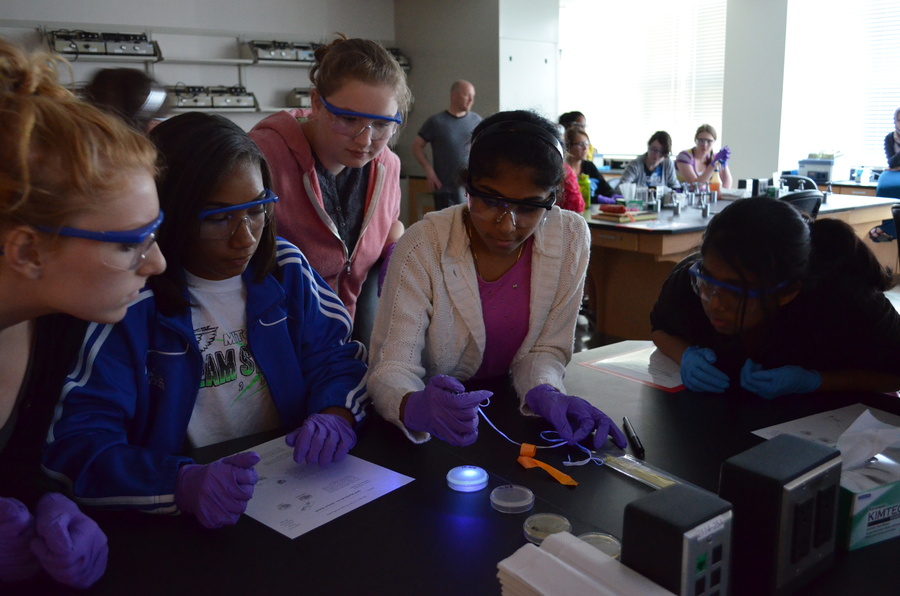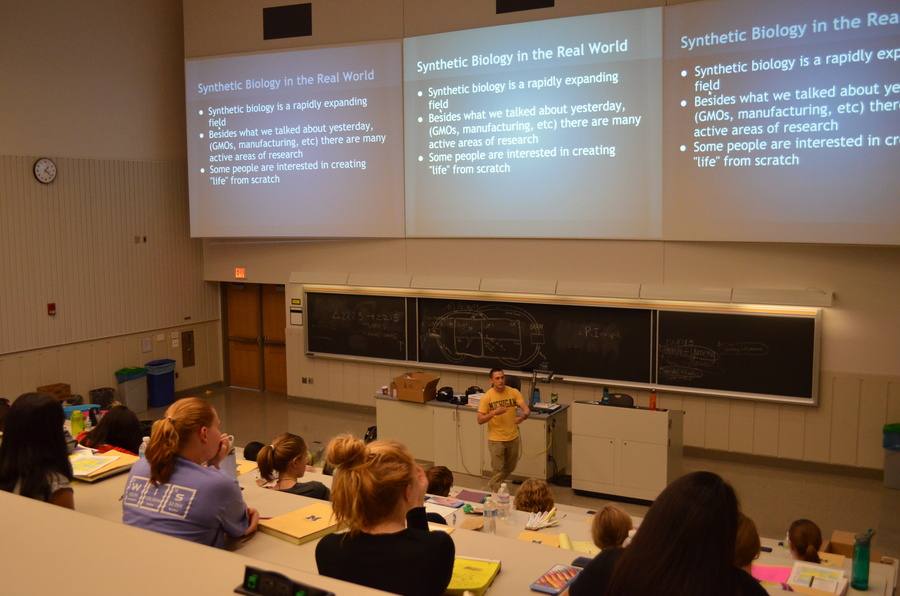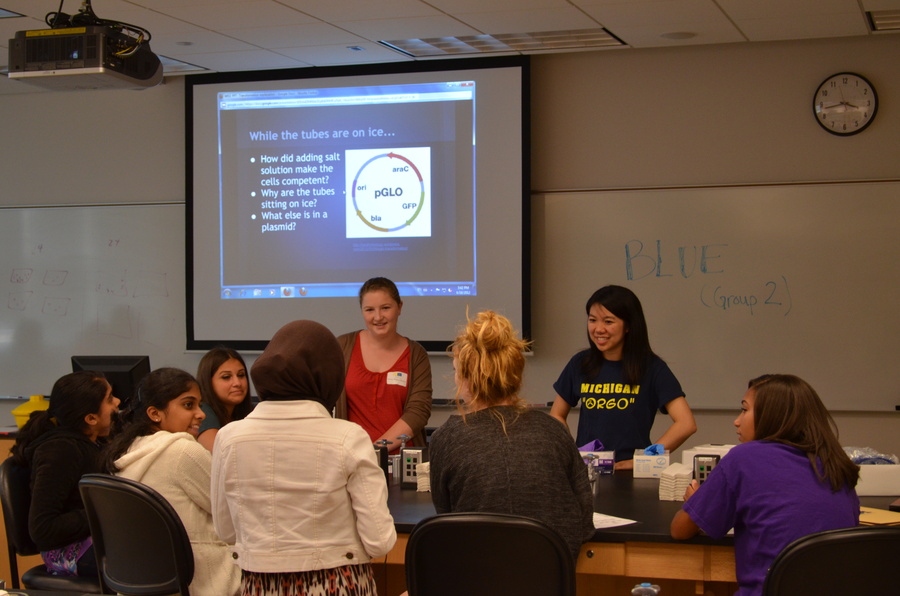Team:Michigan/Outreach
From 2012.igem.org
(Difference between revisions)
| (17 intermediate revisions not shown) | |||
| Line 12: | Line 12: | ||
</h4> | </h4> | ||
| - | Outreach is an important | + | Outreach is an important goal for our team here at the University of Michigan (U-M). From our previous Human Practice projects, we have noticed that there is frequently a negative connotation associated with synthetic biology. In order to address this issue, our team targeted the education of the younger generation, specifically high school students. Since synthetic biology is such a dynamic field, we believe a younger audience would be more willing to accept new ideas rather than older generations that may already have preconceived notions. This year, our team collaborated with Women in Science & Engineering (WISE), a program on the U-M campus. WISE hosted a science and engineering all-day camp for one week during the summer for high school from across the United States to participate in. Our team hosted a two day bio-laboratory session for the students that taught techniques commonly used in synthetic biology and critical problem solving skills. |
<br><br> | <br><br> | ||
| - | + | </html> | |
| - | [[File: | + | [[File:Wise4.JPG|400px|thumb|center]] |
| - | + | <html> | |
<h4> | <h4> | ||
AUDIENCE: | AUDIENCE: | ||
</h4> | </h4> | ||
| - | + | A wide range of students from across the United States -- from Texas and Minnesota to local cities in Michigan -- came to our campus for the science and engineering day camp. The general age ranged from 14 to 18 years old (9th to 12th grade). Although the program was mainly targeted at females interested in science and engineering, we still had one male student among the 48 students that attended the camp. | |
<br><br> | <br><br> | ||
| Line 35: | Line 35: | ||
ACTIVITIES: | ACTIVITIES: | ||
</h4> | </h4> | ||
| - | + | 1) College Panel (lecture)<br> | |
| - | + | 2) pGLO Experiment 1 (lab) <br> | |
| - | 1) College Panel | + | 3) Introduction to iGEM and the Field of Synthetic Biology (lecture)<br> |
| - | 2) pGLO Experiment | + | 2) pGLO Experiment 2 (lab) <br> |
| - | 3) | + | 4) Survey/Feedback Session<br> |
| - | 4) Survey/ | + | |
<br><br> | <br><br> | ||
| + | </html> | ||
| + | [[File:Wise2.JPG|350px|thumb|right|Before each lab session, the students learned about synthetic biology the Michigan iGEM team members.]] | ||
| + | <html> | ||
<h4> | <h4> | ||
CONCLUSION: | CONCLUSION: | ||
</h4> | </h4> | ||
| - | + | The two-day sessions we hosted with the students was a great success and would not have been possible without the support and enthusiasm from the students, teachers, and our team! It was unfortunate we only had two days with the students, but we are sure that the. At the beginning, the students shared the same common misconceptions as the general public did regarding synthetic biology. For example, when asked “what does synthetic biology mean to you?” we encountered the typical answer of “creating frankenstein!” or “creating something from foreign things”. It was interesting to hear their responses, but we redefined synthetic biology for them. During the lab sessions, we guided the students through the many advantages and examples of synthetic biology by experimenting with the potential applications of GFP. During our session of discussing possible applications of pGLO, it was amazing to see how quickly the students learned from our synthetic biology lecture and started thinking critically of what it means to do synthetic biology. Our survey of the 48 students showed a significant amount of the students interested in joining the iGEM at the high school division and would more likely to talk about what they learned about synthetic biology with their friends, family, and teachers. | |
| - | The two-day sessions we hosted with the students was a great success and would not have been possible | + | |
<br><br> | <br><br> | ||
| + | </html> | ||
| + | [[File:Wise5.JPG|350px|thumb|center]] | ||
| + | <html> | ||
<h4> | <h4> | ||
FUTURE DIRECTION: | FUTURE DIRECTION: | ||
</h4> | </h4> | ||
| - | |||
Teaching and advocating synthetic biology does not end after the two day campus. Our team has been invited to the local high school in the city of Ann Arbor, Michigan called Skyline High School to participate in their local science fair and mentor students about synthetic biology techniques. Their science fair will be hosted in the winter semester (January or February 2013), so it is unfortunate we do not have any information to share with the iGEM community at this moment. However, we believe we have built a strong connection with the high school students at the camp. We intend to continue this collaboration with WISE again in the summer of 2013 and recruit high school students on to our team help mentor them through laboratory techniques and regulations. We feel it is crucial to integrate the young generation into our project because they would be at the heart of a dynamically growing field of synthetic biology. Education and advocacy for this field is not a simple task that can be done overnight. We must invest in long term goals and continue to share our enthusiasm the public, especially the young adults. | Teaching and advocating synthetic biology does not end after the two day campus. Our team has been invited to the local high school in the city of Ann Arbor, Michigan called Skyline High School to participate in their local science fair and mentor students about synthetic biology techniques. Their science fair will be hosted in the winter semester (January or February 2013), so it is unfortunate we do not have any information to share with the iGEM community at this moment. However, we believe we have built a strong connection with the high school students at the camp. We intend to continue this collaboration with WISE again in the summer of 2013 and recruit high school students on to our team help mentor them through laboratory techniques and regulations. We feel it is crucial to integrate the young generation into our project because they would be at the heart of a dynamically growing field of synthetic biology. Education and advocacy for this field is not a simple task that can be done overnight. We must invest in long term goals and continue to share our enthusiasm the public, especially the young adults. | ||
<br><br> | <br><br> | ||
| Line 59: | Line 62: | ||
<br> | <br> | ||
| - | This year we hosted two 9th | + | </html> |
| + | [[File:Ocean and Ivor Huang.JPG|350px|thumb|right|Ocean and Ivor (not in lab)]] | ||
| + | <html> | ||
| + | <div class="body"> | ||
| + | <div id="basic"> | ||
| + | |||
| + | |||
| + | This year we hosted two 9th graders, Ocean and Ivor Huang. During their stay, they subcloned LVA into the submission plasmid pSB1C3, and made media to feed this hungry project.<br><br> | ||
| + | |||
One of our team member, Corey Howe, is an undergraduate from Bowling Green State University, Bowling Green, Ohio. | One of our team member, Corey Howe, is an undergraduate from Bowling Green State University, Bowling Green, Ohio. | ||
<br><br> | <br><br> | ||
| + | |||
</div> | </div> | ||
</div> | </div> | ||
</html> | </html> | ||
Latest revision as of 03:07, 4 October 2012
Outreach: Skyline High School Summer Camp, sponsored by Women in Science & Engineering Program
PURPOSE:
Outreach is an important goal for our team here at the University of Michigan (U-M). From our previous Human Practice projects, we have noticed that there is frequently a negative connotation associated with synthetic biology. In order to address this issue, our team targeted the education of the younger generation, specifically high school students. Since synthetic biology is such a dynamic field, we believe a younger audience would be more willing to accept new ideas rather than older generations that may already have preconceived notions. This year, our team collaborated with Women in Science & Engineering (WISE), a program on the U-M campus. WISE hosted a science and engineering all-day camp for one week during the summer for high school from across the United States to participate in. Our team hosted a two day bio-laboratory session for the students that taught techniques commonly used in synthetic biology and critical problem solving skills.
AUDIENCE:
A wide range of students from across the United States -- from Texas and Minnesota to local cities in Michigan -- came to our campus for the science and engineering day camp. The general age ranged from 14 to 18 years old (9th to 12th grade). Although the program was mainly targeted at females interested in science and engineering, we still had one male student among the 48 students that attended the camp.TIME/LOCATION:
Hosted by WISE on the University of Michigan- Ann Arbor campus; June 18 to 22nd 2012ACTIVITIES:
1) College Panel (lecture)2) pGLO Experiment 1 (lab)
3) Introduction to iGEM and the Field of Synthetic Biology (lecture)
2) pGLO Experiment 2 (lab)
4) Survey/Feedback Session
CONCLUSION:
The two-day sessions we hosted with the students was a great success and would not have been possible without the support and enthusiasm from the students, teachers, and our team! It was unfortunate we only had two days with the students, but we are sure that the. At the beginning, the students shared the same common misconceptions as the general public did regarding synthetic biology. For example, when asked “what does synthetic biology mean to you?” we encountered the typical answer of “creating frankenstein!” or “creating something from foreign things”. It was interesting to hear their responses, but we redefined synthetic biology for them. During the lab sessions, we guided the students through the many advantages and examples of synthetic biology by experimenting with the potential applications of GFP. During our session of discussing possible applications of pGLO, it was amazing to see how quickly the students learned from our synthetic biology lecture and started thinking critically of what it means to do synthetic biology. Our survey of the 48 students showed a significant amount of the students interested in joining the iGEM at the high school division and would more likely to talk about what they learned about synthetic biology with their friends, family, and teachers.
FUTURE DIRECTION:
Teaching and advocating synthetic biology does not end after the two day campus. Our team has been invited to the local high school in the city of Ann Arbor, Michigan called Skyline High School to participate in their local science fair and mentor students about synthetic biology techniques. Their science fair will be hosted in the winter semester (January or February 2013), so it is unfortunate we do not have any information to share with the iGEM community at this moment. However, we believe we have built a strong connection with the high school students at the camp. We intend to continue this collaboration with WISE again in the summer of 2013 and recruit high school students on to our team help mentor them through laboratory techniques and regulations. We feel it is crucial to integrate the young generation into our project because they would be at the heart of a dynamically growing field of synthetic biology. Education and advocacy for this field is not a simple task that can be done overnight. We must invest in long term goals and continue to share our enthusiasm the public, especially the young adults.Outreach: Within the lab
This year we hosted two 9th graders, Ocean and Ivor Huang. During their stay, they subcloned LVA into the submission plasmid pSB1C3, and made media to feed this hungry project.
One of our team member, Corey Howe, is an undergraduate from Bowling Green State University, Bowling Green, Ohio.
One of our team member, Corey Howe, is an undergraduate from Bowling Green State University, Bowling Green, Ohio.
 "
"





